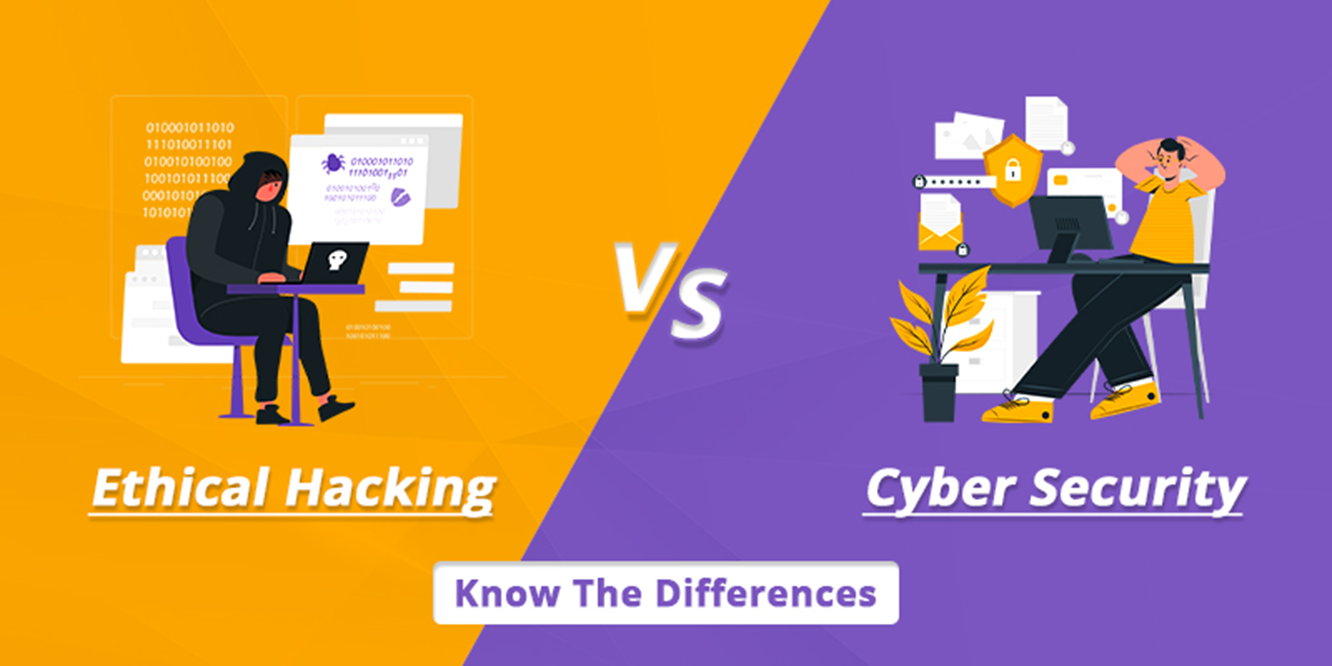In today’s digital age, where technology plays an integral role in our lives, ensuring the security of our online data has become paramount. Two terms often used interchangeably but with distinct meanings are ethical hacking and cybersecurity. In this blog, we will delve into the differences between these two fields, shedding light on their roles, objectives, and the skills required.
Let’s explore the fascinating world of ethical hacking and cybersecurity and understand how they contribute to keeping our digital lives safe. Also, with the help of this Ethical Hacking Course, individuals gain a comprehensive understanding of the variances between ethical hacking and cybersecurity, empowering them to contribute to the ever-evolving landscape of information security.
Ethical hacking, often known as penetration testing or white hat hacking, is a legal and permitted method of evaluating the security of computer systems, networks, and software. Ethical hackers are experienced specialists who seek to uncover vulnerabilities and flaws in digital infrastructure with the permission of the system owner. They employ the same strategies and tools as malevolent hackers but with the goal of assisting organizations in safeguarding their assets and preventing future cyber risks.
Ethical Hacking Essentials:
- Purpose: The fundamental purpose of ethical hacking is to uncover and exploit vulnerabilities in a system in order to assess its security posture. Ethical hackers give significant insights into the vulnerabilities that malevolent actors may exploit by mimicking real-world cyber assaults. Their results assist organizations in strengthening their defenses and safeguarding sensitive data from unauthorized access.
- Methodology: To uncover potential entry points and security gaps, ethical hackers use a variety of techniques such as network scanning, social engineering, and vulnerability assessment. To assess the system’s resilience to assaults, they may also use tools like penetration testing frameworks, vulnerability scanners, and password crackers.
- Legality and Approval: Unlike harmful hackers, ethical hackers work within the law and only perform their actions with the system owner’s explicit approval. This guarantees that the ethical hacker’s actions are lawful and authorized, preserving confidence between the ethical hacker and the organization being tested.
- Understanding Cybersecurity: On the other hand, cybersecurity is a larger topic that involves a variety of practices, technologies, and methods aimed to safeguard computer systems, networks, and data against unauthorized access, assaults, and damage. It includes taking preventative actions, identifying threats, and successfully responding to security occurrences in order to ensure the confidentiality, integrity, and availability of information.
Cybersecurity Essentials:
- Protection and Prevention: Cybersecurity is concerned with protecting systems and networks from possible attacks. It entails putting in place security measures like firewalls, antivirus software, and intrusion detection systems to protect against unauthorized access and data breaches.
- Incident Detection and Response: Cybersecurity specialists keep an eye on systems and networks for any unusual or suspicious activity. They employ cutting-edge tools and technology to detect possible risks in real-time and respond quickly to reduce their damage. Plans and processes for incident response are put in place to minimize damage, investigate security issues, and restore normality.
- Risk Management: Cybersecurity specialists examine the hazards connected with digital assets and devise solutions to manage and reduce those risks. This includes detecting vulnerabilities, establishing security controls, and developing policies and procedures to assure an organization’s overall security posture.
Differentiating between Ethical Hacking and Cybersecurity:
While both ethical hacking and cybersecurity share the goal of protecting digital assets, their methodologies and scopes differ. Here are the main differences between the two:
Let’s take a closer look at the fundamental distinctions between ethical hacking and cybersecurity:
1. Focus and Goal:
Ethical Hacking: The fundamental goal of ethical hacking is to find and exploit flaws in computer systems and networks in order to assess their security. The goal is to identify vulnerabilities before hostile hackers do and to make recommendations for improving security measures.
Cybersecurity: Cybersecurity is a larger term that incorporates numerous elements of securing computer systems, networks, and data. To secure the confidentiality, integrity, and availability of information, it is necessary to apply preventative measures, risk management, incident response, policy formulation, and overall security management.
2. Methodologies and Approaches:
Ethical Hacking: Ethical hackers approach security testing from an attacking standpoint. They utilize network scanning, vulnerability assessment, penetration testing, and social engineering tactics similar to those employed by malevolent hackers. The purpose is to identify and exploit flaws in a controlled and authorized way.
Cybersecurity: Cybersecurity takes a more defensive approach to protecting systems and data. It includes putting in place security controls, firewalls, intrusion detection systems, encryption, access restrictions, and other safeguards. Cybersecurity experts concentrate on risk assessment, system hardening, security architecture design, and security policy and procedure execution.
3. Legality and Authorization:
Hacking Ethics: Ethical hackers only act with the full permission of system owners or administrators. They labor inside legally specified bounds and adhere to the organization’s rules of engagement. Their actions are carried out legally and ethically, in accordance with applicable laws and regulations.
Cybersecurity: Cybersecurity professionals operate under the legal framework established by industry standards, organizational rules, and relevant laws and regulations. Implementing security measures, monitoring systems for vulnerabilities and threats, and ensuring compliance with appropriate security standards are all part of their responsibilities.
4. Responsibility and Scope:
Ethical Hacking: The organization or customer defines the scope of ethical hackers. They look for vulnerabilities in specific systems, networks, or applications. It is their role to identify and disclose vulnerabilities, as well as make recommendations for remedy, without causing harm or interruption to the organization’s activities.
Cybersecurity: Cybersecurity experts have a larger scope that includes the complete organization’s information systems and infrastructure. They are in charge of developing and administering security measures, monitoring systems for threats, responding to events, and ensuring overall asset security.
5. Remediation and Reporting:
Ethical hacking: After executing their evaluations, ethical hackers deliver thorough reports to the organization or customer. These reports describe the vulnerabilities detected, their potential effect, and mitigation or remedy recommendations. The organization next takes steps to remedy the vulnerabilities that have been discovered.
Cybersecurity: Cybersecurity experts are in charge of planning and executing security measures to proactively prevent vulnerabilities and attacks. They constantly monitor systems for security events, respond to issues quickly, and put remedial procedures in place to limit the effect of security breaches or vulnerabilities.













